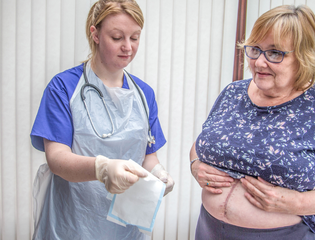Rucaparib approved as first-line maintenance treatment in Scotland
Today, the Scottish Medicines Consortium (SMC) has announced they've approved rucaparib for the treatment of advanced (stage 3 or 4) grade epithelial ovarian, fallopian tube or primary peritoneal cancer. The plan is for it to be used as a maintenance treatment in patients whose cancer has cleared (partially or fully) after first-line platinum-based chemotherapy.
What does this mean in lay terms?
The SMC is the body that decides which medicines are available for prescription in Scotland. They’ve approved a maintenance treatment called rucaparib (brand name Rubraca®) to help women with advanced (stage 3 or 4) high-grade ovarian cancer after they’ve responded well to their first-line chemotherapy. This will be available to all women with a diagnosis, whether or not they have a BRCA gene mutation (or fault).
Previously, this maintenance treatment in Scotland was only available for women without a BRCA mutation whose disease had returned after successful first-line treatment. Now, it can be accessed earlier and by more women.
"I am delighted to hear that Rucaparib has been approved for use after frontline treatment for all ovarian cancer patients in Scotland. It will give other options for patients, following their initial treatment and add to the number of PARP-inhibitors that can be considered for patients.
Having been prescribed a PARP-inhibitor for some time after completion of my frontline treatment for advanced ovarian cancer, I have had personal experience of the benefits of this therapy, experiencing a continued period of remission. These drugs were not available until around five years ago. Being available now - and immediately after the completion of frontline treatment - has improved the outcomes for many patients with ovarian cancer.
The addition of Rucaparib to the list of PARPs that can be considered early on in a patient’s treatment pathway gives more choice for individually tailored treatment and will hopefully result in better outcomes for patients."
Marie-Claire Platt, Director of Research and Policy, says:
“Ovarian cancer survival rates are the same as breast cancer in the 1970s. We desperately need new treatment options and welcome this decision to approve Rucaparib for newly diagnosed women in Scotland. Women across the UK must have the same access to life-
saving treatments to give them the best chance of surviving their disease.”
How does this treatment work?
Rucaparib is a PARP inhibitor. These medications can prevent the spread of cancer by stopping a protein called PARP from performing its usual job of helping damaged cells repair themselves. PARP inhibitors can stop this repair process from happening in damaged ovarian cancer cells, and this causes the cancer cells to weaken and die. This can give women longer periods of time where their disease is stable. Evidence shows that rucaparib significantly improved progression-free survival, which is the time between starting the treatment and showing signs that the disease has started to grow.
You can read more about targeted treatments and how they work here → https://ovarian.org.uk/ovarian-cancer/living-with-ovarian-cancer/ovarian-cancer-treatment/targeted-therapies-for-ovarian-cancer/
How does the SMC make decisions about medications?
The SMC follows a careful process to fully assess whether it is appropriate and cost-effective to recommend any medication. They assess evidence, including studies looking into how effective the drugs are compared to current treatments, advice from medical professionals, and evidence from patient organisations like Ovarian Cancer Action. We submitted evidence collected from our supporters to help explain to the panel what it’s like to be diagnosed with ovarian cancer, and how important access to PARP inhibitors is to them.
You can read more information about this SMC process and decision here: https://scottishmedicines.org.uk/medicines-advice/rucaparib-rubraca-full-smc2799/
You can find out about the eligibility for rucaparib in England here:
https://ovarian.org.uk/news/rucaparib-update-april25/


